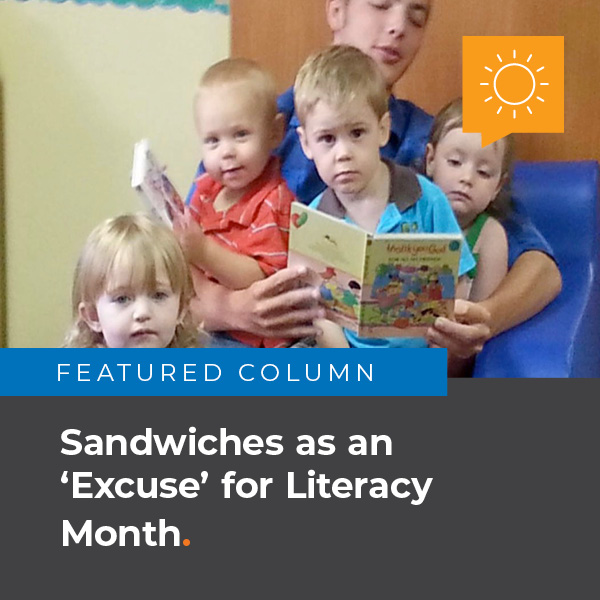By Wyatt Bandt

To call childhood me a bookworm would have been an understatement. I devoured books, and the only thing that (sometimes) stopped me was my vocabulary.
I have a vivid memory of my parents leaving on a vacation during the summer, so my brother and I were at home with a sitter for four days. In preparation, I checked out a stack of books from the library and carefully piled them in the living room where I did most of my reading. By the end of the first day, I finished three novels. The pile was ‘empty’ sometime the third day.
I owe my love of literature and writing in a large part to my mother. Growing up, she read to us over lunch, one of the best parts about being homeschooled. She read my brother and me classics and contemporary novels while we munched on sandwiches and pretzels. A favorite was the Sebastian Darke series, a story about a young man who inherited his father’s jester business and travelled about the countryside with his talking and melodramatic buffalope, Max. My mom voiced all the characters, and her rendition of Max sounded a lot like Boo-Boo from Yogi Bear, just a lot more baritone.
I was surprised with how much I missed when I reread Lord of the Flies as an adult, and we gave up reading A Tree Grows in Brooklyn as a lunchtime book, but my mom encouraged me to read it on my own. It’s now one of my all-time favorites, and if I ever have a daughter, Francie is up there on my list of names.
November 1 is National Family Literacy Month, and it hopes to promote exactly what I experienced as a child. Research have found correlations between caregiver’s literacy and children’s success in education. The conclusion is that the education of parents largely determines that of their kids.
If a parent helps cultivate their kid’s love of reading early, the kid will soon be able to read on their own, which improves writing, reading, and vocabulary skills. I saw this happen to myself as a kid, and I fell in love with books because of my mom and teachers’ help. My mom took us to the library often, and we’d get to pick out the books she’d read to us, and I’d get to pick out a new stack to take home with me. The worst – and potentially best – part about my literacy upbringing was my asking my mother what a word meant, and she’d reply, “You know where the dictionary is.”
Unfortunately, many kids don’t have the same upbringing. One in four kids in America grow up without learning how to read, and students who can’t read by third grade are more four times as likely to drop out of school altogether.
This second point is of particular concern to a friend of mine who is an educator. He works with students who are struggling, and many are very far behind in literacy where they should be. He often says that one of the biggest challenges in teaching a child is how uninvolved the parents are.
“I just don’t know what to do,” he told me one day. “If they can’t read or do basic math, they’re really going to struggle. And the parents aren’t helping because they expect us to do it, when we need their help too.”
If you have kids and even if you don’t, consider celebrating National Family Literacy Month. There are a lot of things you can do. Visit the local library. Read to a niece, student, or child you’re taking care of. If you see a kid reading, engage with them by asking questions. You can also donate unused books to the local library, or even build your own mini-library outside your home.
Some of my favorite memories of growing up were reading with my mom. She loved the time she got to spend with us, and I’m so thankful for it.
Going forward, I’ll continue to spread the love of reading with kids around me and plan to be involved in National Literacy Month. I already have a good track record: back in middle school, reading to the kids in nursery was always a treat.

[cm_page_title title=”Continue Reading” subtitle=” Shelf Unbound”]
Article originally Published in the August / September 2022 Issue: Indie Debuts.
